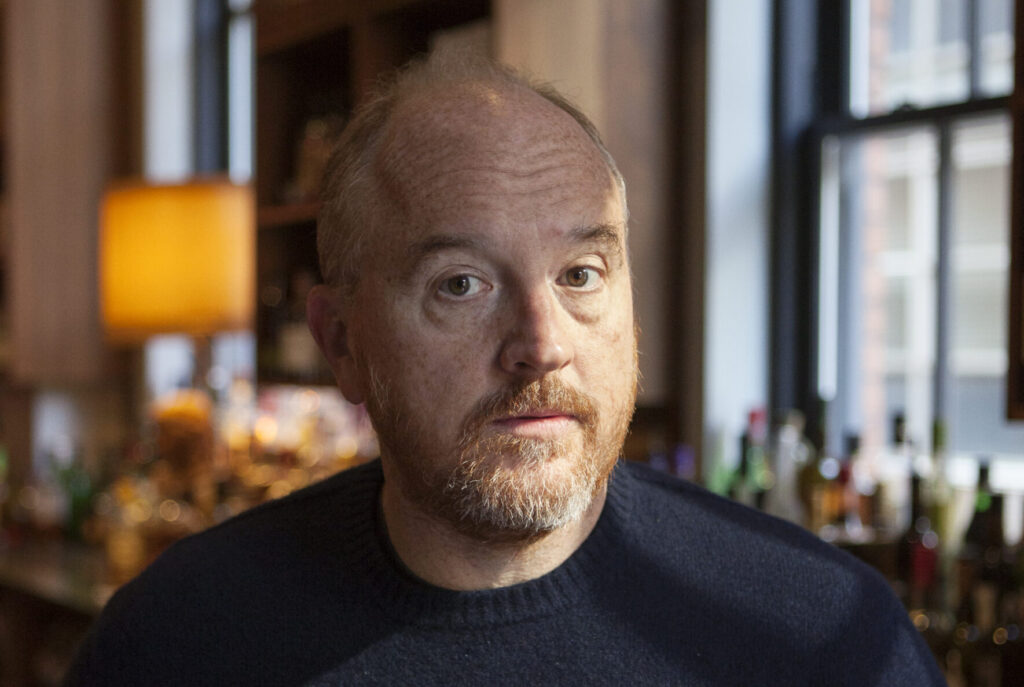
The unusually thought-provoking documentary Sorry/Not Sorry uses the Louis C.K. scandal to explore the issues of consent, cancel culture and #MeToo accountability while protecting survivors. Produced by the New York Times, Sorry/Not Sorry traces comic Louis C.K.’s ascendancy, his abhorrent behavior over a long period of time, its exposure by the NYT, his demise and comeback. That story is well-researched and comprehensive, but the real value of Sorry/Not Sorry is in its discussion of consequence for everyone involved – the perpetrator, the survivors and those who at least should have known.
This story, as have other #MeToo episodes, involved a power imbalance; in this case between C.K. and other comedy professionals who were not as famous as he was. In social situations, C.K. would ask if is was OK if he pulled out his penis and pleasured himself. Apparently, no one voiced the actual words, “I would ask you not to do that because it would offend me and make me feel unsafe“. But who can consent if they can’t imagine that it is a literal request for permission? It’s not consent if someone’s jaw drops and they fidget in their seat.
As icky as this was for women, men were also confounded. After all, heterosexual men generally seek sexual gratification in a woman’s body – looking at it, touching it, uniting with it. Louis C.K. wasn’t seeking a woman’s body to get off, just her presence. Who does that? What kind of sick power trip is that?
In Sorry/Not Sorry, three strong women – Jen Kirkman, Abby Schachner and Megan Koester – give first-hand accounts of what transpired. The NYT investigative team of Jodi Kantor, Cara Buckley and Melena Ryzik explain how they ran down the story. C.K., with remorse, confirmed what had happened, and ceased performing.
You probably already knew these facts, but now Sorry/Not Sorry takes the story further. C.K.’s exposure made Kirkman, Schachner and Koester relive the unpleasantness and subjected them to torrents of hate from anonymous internet trolls; their careers were certainly not helped by the publicity, and were probably hurt. Remember – all they did was to be present when someone else behaved transgressively, and to be truthful when asked about it years later. (Plus, they were mocked by Dave Chappelle, who is more the villain of Sorry/Not Sorry than is Louis C.K.)
In stunning contrast, C.K. revived his public career, albeit at a much lower level, within less than a year. Sorry/Not Sorry raises the question of, at what point should a disgraced transgressor be able to re-enter the mainstream? And just what is the so-called cancel culture?
It’s pretty clear that, in the case of a serial rapist like Harvey Weinstein, the offender should be incarcerated to protect the public and never be allowed to enjoy a public career again. But, as #MeToo offenses go, Louis C.K. presents a somewhat unique case in two ways. First, he didn’t physically hurt or violate the women; he disgusted and appalled them. Second, he honestly and contritely answered the charges with “These stories are true“, which is a long way from the standard #MeToo response, which is more like “I never met the woman in my life, and it was all her idea“. So, in this case, it doesn’t seem like justice requires his permanent exile, public silencing and unemployment.
But, if not permanently, for how long?
Louis C.K. did endure public disgrace, had his career sidelined for most of a year and lost the ability to earn TENS of millions of dollars. But he has resumed making mere MILLIONS of dollars and being idolized by his diehard fan base. Given the relative situations of the women involved, it doesn’t feel right.
These questions are pondered in Sorry/Not Sorry by an array of talking heads, the most sensible being Parks and Recreation creator Michael Schnur and comedian Aida Rodriguez.
This is a smart and revelatory film. Sorry/Not Sorry releases on July 12th, both into select LA and NYC theaters and digitally.
